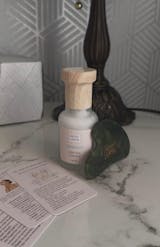What Is Organic Jojoba Oil?
Jojoba (Simmondsia chinensis) is a hardy shrub native to the Sonoran Desert. Its seeds contain roughly 48 %–53 % liquid wax composed of long‐chain fatty esters 1, which means jojoba oil is actually a liquid wax rather than a true triglyceride. The wax’s composition includes C16–C24 fatty acids and fatty alcohols and resembles human sebum 2. It also contains natural tocopherols and phytosterols 1 that act as antioxidants. Historically, Indigenous peoples of Baja California applied the oil from roasted jojoba nuts to heal cuts, scratches and sores 3, hinting at its soothing properties long before modern science confirmed them.
Research‐Backed Skin Benefits of Jojoba Oil
Science now backs many of the traditional claims about jojoba oil. Here are the key benefits supported by peer‐reviewed studies:
Moisturising & Barrier Repair
• Immediate softening and hydration:
Jojoba oil acts as a powerful emollient that increases skin extensibility and suppleness, leaving the surface softer without a greasy feel 4. A controlled study showed that jojoba oil significantly improved skin flexibility within five minutes, with results lasting for hours 5.
• Reduces moisture loss:
Because jojoba’s wax esters mimic human sebum, it forms a breathable film that reduces trans‐epidermal water loss without blocking pores 6. Researchers found that this barrier helps smooth dry, flaking skin and boosts elasticity 7.
• Improves elasticity and shine:
Skin indentation tests revealed that jojoba oil enhances elasticity and restores the skin’s natural shine 8. Hydrogenated jojoba oil also penetrates quickly and provides occlusive benefits 9, making it a versatile moisturiser for dry or mature skin.
Acne & Sebum Regulation
• Dissolves clogged sebum:
As a liquid wax, jojoba can penetrate hair follicles and dissolve sebum deposits. Clinical observations showed that it effectively cleared acne lesions without causing irritation 10. Research in Verywell Health notes that jojoba oil can dissolve acne‐causing sebum and that users report minimal itching or burning 11
• Supports treatment of psoriasis and seborrheic dermatitis:
Jojoba oil’s keratoplastic and mild
keratolytic actions make it a useful adjunct for conditions characterised by scaling. In studies of patients with acne vulgaris and psoriasis, the oil was effective and well tolerated 12. Its high wax‐ester content makes it a good repair option for dermatoses with altered skin barriers, including seborrheic and eczematous dermatitis 13.
Anti‐Inflammatory & Wound Healing
-
Blocks inflammatory pathways:
Jojoba oil contains vitamin E and other antioxidants that calm inflammation. In an ex‐vivo human skin model, topically applied jojoba wax reduced pro‐inflammatory cytokines IL‐6, IL‐8 and TNF‐α by about 30 % compared with untreated tissue 14. The same study found increased synthesis of pro‐collagen III and hyaluronic acid 15, suggesting jojoba may promote firmer, more hydrated skin.
-
Inhibits COX‐2 and LOX enzymes:
Earlier pharmacological research demonstrated that jojoba oil’s anti‐inflammatory activity involves blocking cyclo‐oxygenase II and lipoxygenase 16. Animal studies also showed reductions in edema and prostaglandin E2 following jojoba treatment 17.
-
Soothes rashes and sunburn:
Clinical trials have found that jojoba liquid wax is as effective as standard medicated creams for diaper rash but without systemic side‐effects 18. Verywell Health notes that jojoba oil is included in many sunburn‐relief products and can calm inflammation caused by UV exposure 19.
-
Promotes wound healing:
Preliminary laboratory studies indicate that jojoba oil’s vitamin E content may stimulate collagen production and support wound healing 20. Traditional accounts of applying roasted jojoba seeds to wounds 21 align with these findings.
Antibacterial & Antioxidant Effects
-
Inhibits pathogenic microbes:
-
Rich in antioxidants:
-
Possible antibacterial skin care:
Verywell Health reports that some animal studies suggest jojoba oil prevents growth of Staphylococcus aureus, a bacterium associated with skin infections 25; however, human data are still limited.
Scalp & Hair Benefits
-
Moisturises the scalp:
Jojoba oil is often used as a scalp treatment. Its anti‐inflammatory properties may alleviate dry, itchy scalp and dandruff 26.
-
May strengthen hair:
Anecdotal reports and early research suggest that jojoba oil may help reduce hair breakage and support hair strength, although more studies are needed 27.
Choosing High‐Quality Jojoba Oil
To gain these benefits, select a product that meets the following criteria:
-
Certified organic and cold‐pressed:
Natural oils with a higher linoleic‐to‐oleic acid ratio are better for barrier repair, and cold pressing is the preferred extraction method because it preserves beneficial lipids and limits irritating by‐products 28.
-
Unrefined and hexane‐free:
Look for unrefined jojoba oil without added fragrances or solvents. Refinement can strip away antioxidants and reduce efficacy.
-
Dark glass packaging:
Antioxidants like vitamin E degrade when exposed to light. Choose oils packaged in amber or dark glass to extend shelf life.
-
Ethically sourced:
Opt for brands that use sustainable farming practices and fair‐trade sourcing to ensure high‐quality seeds and minimal environmental impact.
How to Use Jojoba Oil in a Natural Skin‐Care Routine
Jojoba oil is versatile and can replace multiple conventional products. Here are simple ways to incorporate it into your regimen:
-
-
Facial moisturiser or serum:
Apply a few drops to damp skin after cleansing. The oil’s emollient properties lock in moisture and leave a satin finish.
-
Body oil or lotion booster:
Mix jojoba oil with unscented lotion for an extra dose of hydration. Its quick‐absorbing nature prevents a greasy feel.
-
Sunscreen and barrier creams:
Some natural sunscreens and barrier creams use jojoba oil to enhance spreadability and moisturisation 29.
-
Make‐up remover:
The waxy structure effectively dissolves make‐up and sunscreen without stripping the skin.
-
Shaving oil:
Apply a thin layer before shaving to reduce friction and irritation 30.
-
Scalp oil or mask:
Massage into the scalp before shampooing or leave on overnight as a hydrating mask 27 .
-
Safety Tips
Most people tolerate jojoba oil well, but a few precautions apply:
-
Perform a patch test:
Apply a small amount to the inside of your arm daily for a few days to check for sensitivity 31. -
Avoid if allergic:
People with known allergies to jojoba should refrain from using it 32.
-
Consult a dermatologist:
If you have chronic skin conditions or are using prescription treatments, talk to a dermatologist before adding new oils 33 .
Conclusion
Organic jojoba oil has earned its reputation in the natural skincare world. Research shows that this liquid wax mimics the skin’s sebum, locks in moisture, calms inflammation, dissolves clogged pores and even offers antibacterial and antioxidant protection 34 14. By choosing cold‐pressed, certified‐organic jojoba oil and incorporating it into a balanced routine, you can enjoy smoother, healthier skin without synthetic additives. For anyone seeking natural, research‐backed skincare, jojoba oil is a smart investment.
1 2 14 15 Topical application of jojoba (Simmondsia chinensis L.) wax enhances the synthesis of pro- collagen III and hyaluronic acid and reduces inflammation in the ex-vivo human skin organ culture model - PMC
https://pmc.ncbi.nlm.nih.gov/articles/PMC10855461/
3 4 6 7 8 9 10 12 16 17 18 21 22 23 24 34 Jojoba Oil: An Updated Comprehensive Review on Chemistry, Pharmaceutical Uses, and Toxicity - PMC
https://pmc.ncbi.nlm.nih.gov/articles/PMC8197201/
5 11 19 20 25 26 27 29 30 31 32 33 7 Jojoba Oil Benefits for Skin https://www.verywellhealth.com/jojoba-oil-for-skin-11723877
13 Anti-Inflammatory and Skin Barrier Repair Effects of Topical Application of Some Plant Oils - PMC https://pmc.ncbi.nlm.nih.gov/articles/PMC5796020/
28 Natural Oils for Skin-Barrier Repair: Ancient Compounds Now Backed by Modern Science - PubMed https://pubmed.ncbi.nlm.nih.gov/28707186/





